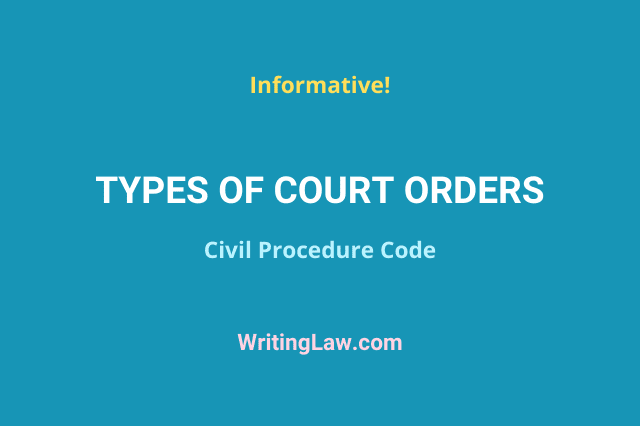
This article discusses various types of categorisation of court orders. All decrees are orders, whereas the reverse is not true. One order sheet (which may contain numerous pages) per case is maintained by the court in each case filed before it. A court may pass orders at any stage of the suit, like at the time of admissibility of the suit, during hearings, at the evidence stage, etc. All final orders are decrees.
Order is defined in section 2(14) of the Code of Civil Procedure, 1908, which states that it is the formal expression of any civil court’s decision and not a decree. Some of the orders mentioned below are much needed in daily life and for judicial services examinations conducted by various states.
So let us get right in and learn about the various types of court orders under the Civil Procedure Code in India.
1. Interlocutory Orders
These orders are also called interim orders. The purpose of an interlocutory order is to resolve any issues that arise throughout the case. Such orders are made to achieve some aim or purpose required and vital to the case’s development. They are generally incidental to the issues that the court will resolve in the ultimate decision. These are not final orders.
2. Permanent Orders
If the parties cannot reach an agreement before their hearing date, they will be required to attend a hearing known as a permanent order hearing. These orders will be in effect indefinitely and will not be changed for the remainder of the parties’ lives.
3. Mandatory Orders
A privilege order directing an inferior court, tribunal, or other public body to undertake a defined public duty relating to its obligations, which can be obtained through a judicial review application to the High Court. It is also known as the Writ of Mandamus.
4. Final Order
It disposes of all the claims and adjudicates the rights and liabilities of parties in a suit. It terminates the proceeding of a court, or in other words, it terminates litigation. It also refers to an order that has not been stayed, appealed, reviewed, amended or recalled.
5. Speaking Order
Such orders speak for themselves. If the order can be brief and explain why it was passed, it is a speaking order. All of the questions specifics, unambiguous results and a justification should be included in the order.
6. Non-Speaking Order
An order that is not speaking is called a non-speaking order. It is order without reasoning and findings. The impugned order is a non-speaking order. Such orders subvert judicial integrity.
7. Anton Pillar Orders
An order that requires one party (the respondent) to allow the other party (the applicant) to inspect, remove or make copies of documents or other items which might provide evidence in an action or action against the respondent. The order of Anton Piller is also known as a search order. Such orders are granted in copyright infringements, trademarks, patents etc.
8. Remand Order
It is an order to send the accused back into custody. In such cases accused is denied bail and should remain in custody till the date mentioned in the order.
9. Stay Order
The act of a higher court ordering a temporary halt to a legal proceeding. It is generally opted to secure the rights of one party over the other. Taking note of its misuse, the Supreme Court said: All stay orders have a time limit of six months in the latest landmark judgement – Asian Resurfacing Road Agency vs Central Bureau of Investigation.
10. Garnishee Order
A court order allows you to retrieve judgement debt from the bank account of the other party or from someone else who is owing money to the other party. It is used more in recovering debts from salary or wage, bank accounts etc.
11. Restraining Order
A restraining order is called an order issued by the court, preventing a person from harassing and contacting someone. It is provided in principle to safeguard the life of the individual from danger or danger anticipation. A person may not perform something for a permanent duration or for a temporary amount of time. It is an order issued in the future to prevent assault or harassment of the accused. If the abuser continues to breach the orders, the police can arrest him and punish him through the courts.
12. Protection Order
A court order designed to enable protection to one party against the other party’s harassment or abuse. In this order, the partner’s behaviour can be limited by a judge.
13. Rejection Order
It is an order of the court rejecting the plaint because it has not met certain standards like a bar on limitation, non-disclosure of a cause of action, etc. The rejection of an order is also called a deemed decree. In other words, it is called a dismissal order or order of dismissal.
Is the order appealable? There is only one decree to a suit, but there can be numerous orders. Some orders are appealable, and some are not. It is defined in the respective statutes as to where lies the appeal. In the Code of Civil Procedure, the list is provided under section 104 and order 43 of the Code as to which orders are appealable.
Conclusion
It is the duty of every individual to give respect to court orders. If any such order of the court aggrieves the party, he can approach the proper court as mentioned in the statute to get relief.
Read Next:
1. 5 Types of Court Opinions and Their Significance
2. Criminal Appeal and Its Kind Under CrPC
- 10 Types or Kinds of Jurisdiction of Indian Courts - 13th April 2022
- Malicious Charge of Offence Under Section 211 of the Indian Penal Code - 17th March 2022
- About Supreme Court of India – Collegium, Powers, Judges - 7th February 2022







